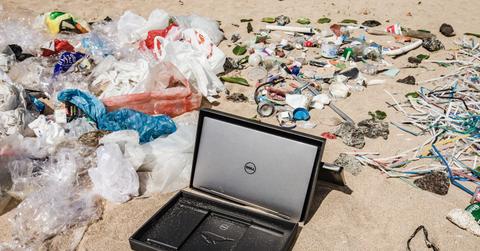Dell And Lonely Whale Launch Collaboration To Keep Plastic Out Of The Ocean
An open source network for companies has been developed by Dell and Adrian Grenier's Lonely Whale foundation that will hopefully developed a pipeline that intercepts plastic before it gets to our waterways.
Updated May 28 2019, 5:16 p.m. ET
Many companies have begun to use recycled plastic and other materials in their production line. Those products are created through a very specific assembly line with a supported infrastructure. But how to account for the enormous amount of plastic waste that ends up floating in the ocean?
Fast Company reports that larger corporations are helping to establish a pipeline from the ocean's plastic waste issue to their products. Dell, which has been using recycled plastic since 2008, committed in April to making the plastic trays holding new Dell laptops in their boxes from 25% ocean plastic and 75% other recycled plastics. This may sound like a small fraction of the problem, but they have already rescued 16,000 pounds of plastic that would otherwise be in the world's water at this point.
The decision to support an initiative like this also has larger implications. Dell has been collaborating with Lonely Whale, the ocean advocacy foundation created by actor Adrian Grenier. The foundation specifically works on reducing plastic waste in the ocean, which adds up to about 8 million tons a year.
Against 8 million tons, 16,000 pounds seems even smaller. But one of the greatest challenges with clearing plastic from the ocean is that there's no established market for it. If a company like Dell is willing to invest in developing the support necessary for channeling this plastic into production, it will make it a lot easier for other companies to join in. In 2016, Dell and Lonely Whale ran a feasibility study in Haiti where they had to figure out how the plastic would be collected, washed and treated so it could be included in the trays. The experiment was enough of a success to encourage expansion.
The production line doesn't directly fish the plastic from the ocean; it intercepts it before it gets there. Lonely Whale and Dell have been working to expand in Indonesia, which is a country with the world's largest accumulation of marine debris. Establishing a line of production there has been a complicated process, so they've taken yet another step.
Together they launched NextWave Plastics, an initiative that invited scientists, private companies, NGOS, and other researchers to work on growing the chain and developing the use of plastic that are headed for the open sea.
A number of companies have joined NextWave, and are incorporating objects made from the recycled plastic into their line, like Trek Bicycle Corporation. Their plastic cage which holds water bottles on bicycles is exactly the same as it has always been—except it's made from more sustainable material. Engineer Stefan Berggren told Fast Company that the ease of using the material is inspiring.
“We’re just getting started,” Berggren explained. “As a part of this effort, we’re evaluating where we use plastics currently, and looking into where there might be more opportunities to integrate this material.”
It's important for Lonely Whale's founder that people understand there's no need to compete in this market. NextWave is encouraging people to work as a group so a sustainable line of production can be built, one that will direct plastic from all of our waterways.
“This isn’t a proprietary PR stunt,” Grenier said. “This is going to scale globally, to the extent where we can have a real impact. There’s not room for competition here–we all have to work together.”
